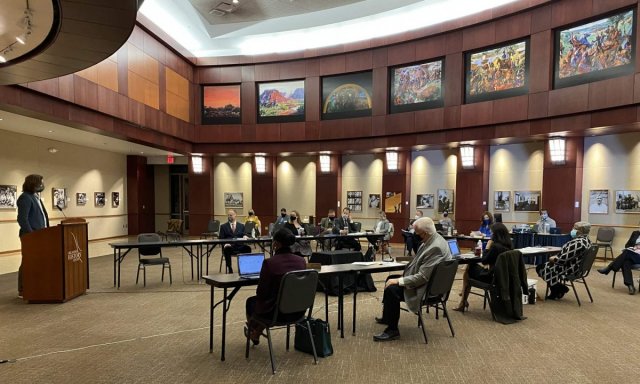

During an Oklahoma State Board of Education meeting Thursday, board members unanimously approved suspending 2020-2021 school report cards owing to COVID-19.
The school report cards give schools a letter grading between A-F based off of indicators that include state assessments, chronic absenteeism, academic growth and graduation rates and post-secondary opportunities.
“We do think it’s necessary to get information about how kids are doing this year so we can support these students and these schools to get students back on track,” Deputy Superintendent of Assessment and Accountability Maria Harris said during the meeting. “We also know that the data may look a lot different. We can get information about students and provide meaningful information to schools and stakeholders without labeling schools letter grades.”
Students did not take state assessments last year, but they will do so this spring, with the next round of school report cards coming in the fall of 2022.
Gov. Kevin Stitt announced adjustments on Thursday as well, moving pre-K through 12th grade teachers and support staff to phase two of the state’s COVID-19 vaccine distribution plan. Teachers were originally in phase three of the distribution hierarchy.
During the announcement, Stitt put pressure on local school boards to return to in-person learning for the spring semester.
“We cannot lose another semester educating our young people,” Stitt said during the press conference. “My goal is to get every kid in school in person in January, however we need to do it.”
Stitt also suggested the State Board of Education could get involved in the process and provide pressure.
“The State Board could potentially pass some type of rule that could supersede some of the local decisions,” Stitt said.
Lindsey Nicole Henry Scholarship program
Without discussion, the board also approved Christian Heritage Academy’s application to participate in the Lindsey Nicole Henry Scholarship for Students with Disabilities program.
The state program provides scholarships to students with disabilities in order to attend a private school approved by the State Board of Education.
However, in order for private schools to participate in the program, they must provide an assurance that they do not discriminate on the basis provided in U.S. Code 2000d, which includes discrimination on the grounds of race, color or national origin. An executive order at the federal level going into effect in 2019 extended non-discrimination protections to include religion, age, gender and sexual orientation.
The school’s application was originally denied in a September meeting, at the recommendation of the board’s legal counsel Brad Clark, as he did “not feel confident that the policies in place as part of the application were compliant with administrative rules.”
The private Christian school’s participation in the scholarship program has been a point of contention for board members. The board had requested a written opinion from the Oklahoma Attorney General’s Office regarding the application for the scholarship program. Attorney General Mike Hunter’s opinion stated that state-funded scholarships cannot be withheld from a private school unless it discriminates against students based on race, color or national origin.
Gov. Kevin Stitt removed his own appointment, Kurt Bollenbach, from the State Board in early December, owing to his stance on private schools participation in the program.
“Those board members serve at the pleasure of the governor and when the vote came out that we were denying to some Christian schools in Oklahoma the Lindsey Nicole Henry (Scholarship), and they’d kind of gone against what the attorney general had said, we’re going to follow the rule of law in Oklahoma,” Stitt told NonDoc. “I think you’re seeing that play out when we saw the attorney general’s opinion.”
Sovereign Community School
During the meeting, the board also voted to begin the process of terminating their charter authorization contract with Sovereign Community School.
The charter school, which focuses on serving its’ approximately 103 Indigenous students, had its accreditation status put “under probation” at a November board meeting. The probation status was approved by the board owing to a lack of communication with the State Department of Education and compliance with accreditation standards, including inconsistencies in financial reporting.
“I will say there has been a lot of communication to me primarily,” Clark said. “There has been a great improvement in that area of communication.”
However, Superintendent of Public Instruction Joy Hofmeister expressed concerns surrounding the progress school leaders had made to meet their contractual obligations.
“I’m very concerned about where we are and the ability to get where we need to be,” Hofmeister said. “The obligations that are legally required have not yet been met.”
Board member Carlisha Bradley expressed concerns over the school’s financial forecast.
“As an authorizing body, for us to stand by, it’s crucial that there’s a time marker on at this point so that families and students can begin to choose that next option for them and teachers and staff can begin to apply at other places to ensure that there’s a runway for that next step,” Bradley said. “I’m at the point where I feel that we’re very far gone and it will be challenging to get back on track at this juncture.”
A hearing will be scheduled within 90 days of Thursday’s board meeting where Sovereign Community School will be able to defend their accreditation status.




















